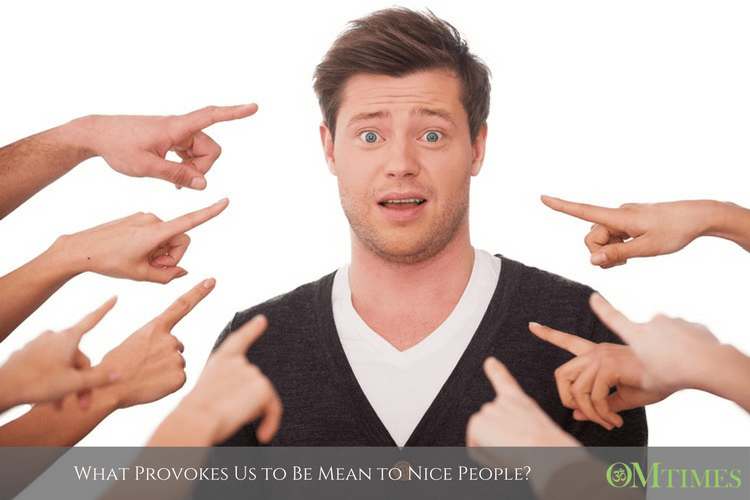What Provokes Us to Be Mean to Nice People?

Do nice people just have a target painted on them or is it something else?
Why are People Mean to Nice People?
There’s another side to the story of kind versus nice, and that’s the story of those who are hurtful or disrespectful to the nice person. Who are these people and what’s driving their behavior?
We know what makes someone kind: it’s an outpouring of positive self-regard onto others. What makes someone nice is a need for external validation that’s meant to build their self-esteem.
But, what makes someone take advantage of the person who’s being nice? What makes an individual see the nice person as someone they can push around, take advantage of, even bully?
In every one of us, there’s an inner struggle, between the light and the shadow sides of our personality. Most often, the light part wins the battle; sometimes the dark part wins.
Every human being has occasional dark thoughts, feelings, and urges. Most of us can contain these, most of the time. Now and then, our dark side is provoked a bit more strongly, and we end up being not so nice.
What provokes the shadow side of our personality to come out? When we’re overtired, overly stressed or really angry, it’s much harder to contain our impulses, and something nasty can leak out: a hurtful comment, a selfish choice, a thoughtless act.
Often, we want to do the right thing, but other people can provoke us to behave badly, especially when they make us uncomfortable or vulnerable, or when they make it just too easy for us to do the wrong thing.
Nice people can easily tempt us to take advantage of them or be contemptuous of them. Their desperation for approval, their eagerness to please, their over-attentiveness to our needs can make us extremely uncomfortable, or extremely greedy.
We see in the nice person an exaggerated version of our own needy, desperate self; the nice person is behaving in a way that if it were us, we’d be mortified for anyone to see. They’re openly pleasing, openly seeking approval, and we squirm in our boots on their behalf.
Some of us get so uncomfortable at the nice person’s desperate attempts at being validated that we become angry at them. We can’t tolerate our own, barely-acknowledged neediness and it’s too threatening to see these nice people openly exhibiting theirs.
Some of us get so angry at the nice people among us that we’ll punish them for reminding us of the places within us that are weak, needy and dependent on other people’s approval. We’ll be rude, hurtful, exploitative to teach them a lesson about trying too hard to please.
Some of us are opportunists who, at the moment, aren’t considering how our actions affect others. If someone is so foolish as to be a people-pleaser, we’ll gladly allow them to give us what we want. Our disdain for these nice people makes us callous, so we don’t think about the impact of our rudeness or exploitation on their feelings or their lives.
The other side of being nice is the fact that some of us will take advantage of the nice person, and some of us will be mean to them. Whether we’re cruel out of our discomfort or just ready to take advantage of their need to please, the nice person will always have to deal with people who mistreat them.
Interestingly, most of us will flip-flop, at various times in our lives, between being too nice and being an opportunist. Sometimes we’re trying to win approval from someone, and sometimes we’re looking down on a person who’s being nice to us.
If we’re honest with ourselves, we can recognize that sometimes we’re in the nice role, and sometimes we’re on the other side of the equation, being an opportunist.
That’s what’s interesting about human nature. We often play different roles. That’s why we can have such a strong reaction to the overly nice person. At any time, to our great humiliation, we might be acting just like them.
You will also enjoy Lessons Learned from Working Minimally
Dr. Marcia Sirota is a Toronto-based board certified psychiatrist specializing in the treatment of trauma and addiction, as well as founder of the Ruthless Compassion Institute, whose mandate is to promote the philosophy of Ruthless Compassion and in so doing, improve the lives of people, everywhere.




